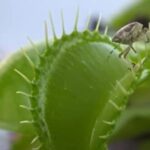As an Amazon Associate, this site earns commissions from qualifying purchases. For more details, click here.
This question is one that is often asked due to the way Venus flytraps behave. In fact, the question that is really being asked here is, are Venus flytraps conscious, sentient beings? Can they feel pain and other emotions like animals and humans?
Venus flytraps are alive but not conscious. They do not have a brain or a nervous system so they cannot feel pain or any sensation. Venus flytraps catch prey when stimulated but they do not have any awareness or any semblance thought.
Do Venus Flytraps Have Consciousness?
Sentience or consciousness is defined as being aware of itself and its surroundings. It can also be described as the ability to experience emotions like fear, pleasure and pain.
The scientific consensus is that Venus flytraps and all plants are not sentient. Its traps may catch a prey and consume it, but research shows the plant is not aware of this.
To be sentient requires a brain and nervous system. Humans are sentient, conscious beings and there is scientific evidence showing animals are sentient as well.
Venus flytraps do not have brains or a nervous system. Without a nerve receptor there is no way they can feel pain or any other sensation.
Carnivorous plants react to stimuli which allows them to capture prey. They can also transmit electrical impulses to other leaves, but scientists do not consider this a nervous system.
The differences between plants and animals are enough to demonstrate why Venus flytraps are classified as plants. And as shown here, Venus flytraps – like all plants – have not shown any evidence of being sentient.
The Difference between Being Alive and Conscious
Venus flytraps grow, reproduce and can respond to stimuli, therefore it is a living thing. Consciousness means being aware of itself and its environment. There is no evidence to suggest Venus flytraps or any plant can do this, so they are not conscious.
For example, a cat stalks its prey in silence because it knows any sound could alert its intended victim. So the cat is aware of its environment and its possible effect.
Most animals such as deer, fish etc. flee from predators and hide when they sense any danger. With Venus flytraps and other plants, the consensus is that their actions are based on reaction to stimuli.
The topic of plant consciousness is hotly debated, but most scientists and botanists believe plants such as Venus flytrap respond to triggers and are not aware of it.
The consensus is that plants lack the complex elements to develop consciousness. If Venus flytraps are conscious, they would need something like a brain and nervous system, both of which requires a lot of energy.
Part of the reason the topic is controversial stems from the behavior of plants. If you watch a Venus flytrap in action, it would seem that they are aware of their environment and act accordingly. The same can be said for other plants.
But according to scientists, what we see in plants are their stimulus responses. Yes, Venus flytraps can respond to prey and communicate with other leaves and other plants. But none of these are regarded as evidence that plants know what is happening around them.
Bottom line: plants do not have the complex processes that is required for consciousness. Based on what we know, perception, feelings and other cognitive abilities are only possible if the organism has a complex structure to support it.
Do Venus Flytraps Feel Pain?
Venus flytraps do not feel pain because they do not have receptors for it. Humans and other animals can feel because they have nervous receptors that transmit the sensation to the brain and the body reacts accordingly. Plants do not have that capability.
Venus flytraps are still vulnerable to hurt and damage though. Cutting off the leaves with Wevove Pruning Shears or just poking it repeatedly can stress the plant. This can stunt its growth or lead to premature death.
So even though Venus flytraps cannot feel pain like us, they do get stressed under certain conditions. If you own a Venus flytrap you have to make sure the plant is well cared for to ensure its growth.
Venus flytraps are also negatively affected by lack of dormancy. Like most plants, Venus flytraps go to sleep or hibernate during winter and blossom again in the spring.
Venus flytraps need 3 to 5 months of dormancy. The lack of it will limit growth or even cause death. For best results, give the plant about 10 weeks of dormancy.
Another potential problem is confusing dormancy with death. As winter approaches, a Venus flytrap sheds its leaves and turn brown. The traps stop working and the plant looks forlorn.
At this stage it is easy to think the plant is dying. This could lead to over watering or overfeeding in an attempt to keep the plant alive.
This will make things worse and could actually kill the Venus flytrap. While it cannot experience pain, these activities will trigger responses when the plant should be preparing for dormancy.
Using the right type of soil is important, so use only nutrition free materials like Perfect Plants Carnivorous Soil. If the plant is outdoors you do not have to worry about feeding it. But if the Venus flytrap is indoors, give it something nutritious so the plant can absorb nutrients in case there are few insects around.
Do Venus Flytraps Have Feelings?
Venus flytraps do not have feelings because they are not sentient. They are not aware of other plants and only react to stimuli. Without stimuli the plant will not act.
When a Venus flytrap opens its trap to capture a frog for instance, it does so because the filaments on its lobes have been triggered.
It is an automatic response and does not involve its feelings. As mentioned earlier, Venus flytraps do not have a built in mechanism that will allow them to feel.
When a Venus flytrap consumes prey, it does not feel anything. It is not aware of what is going on around its environment.
It is not acting instinctively like an animal. Its actions or responses are mechanisms that have been set off. In other words, a Venus flytrap is not aware of its prey. Its trap simply reacts to the filaments being touched by an insect
The scientific evidence shows plants are not conscious and without consciousness and a nervous system, an organism cannot feel.
For plants to be sentient, they must not only be aware but also have meta memory, that is know that they know or do not know. This function is found in the brain and since plants don’t have one, they lack this feature.
Are Venus Flytraps Intelligent?
Venus flytraps are so efficient in capturing prey it looks as if they know what they are doing. While watching its traps in action look like the work of something intelligent, it is not.
Venus flytraps do not have brains. But their mechanisms have been fine tuned to catch prey. The ability of Venus flytraps to capture animals is a product of natural adaptation. These plants grow in poor soil with very little nutrients. So the Venus flytrap evolved, obtaining its nutrients through insects and other small animals.
The belief that plants are intelligent comes from the way they react when stimulated. If an insect falls into its trap the Venus Flytrap springs into action, folding its leaves and eating the insect.
On the surface this looks similar to an animal predator waiting patiently for its prey. But there is a difference between the two.
The traps of a Venus flytrap have triggers, and if an animal touches these the trap will close. in other words, the trap is activated by the stimuli.
Venus flytraps developed this amazing capability to compensate for the lack of nutrition in the soil. These mechanisms are perfectly honed to catch insects and other small prey. However it is brought about by stimuli and not indicative of intelligence.
Conclusion
The subject of consciousness in animals is a controversial one, to say nothing of plants possibly being self aware. But based on all available scientific evidence, there is no indication that Venus flytraps or any plants have consciousness.

My fascination with carnivorous plants began many, many years ago with Venus Fly Traps. Now I am more than happy to impart what I know with other enthusiasts and those who are curious about meat eating plants.



